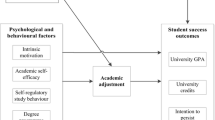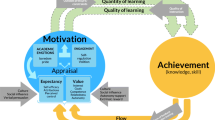Abstract
In this study, we examined relationships between learning environment characteristics (disciplinary climate, teacher support, and teacher feedback) and student outcomes (enjoyment of reading, and reading achievement) among 12,058 students from China who took part in the 2018 Programme for International Student Assessment. The results of structural equation modeling analyses revealed that teacher feedback and enjoyment of reading each had a statistically significant association with reading achievement. Additionally, enjoyment of reading mediated the association between teacher feedback and reading achievement.


Similar content being viewed by others
References
Afari, E., Aldridge, J. M., Fraser, B. J., & Khine, M. S. (2013). Students’ perceptions of the learning environment and attitudes in game-based mathematics classrooms. Learning Environments Research, 16(1), 131–150.
Altun, A., & Kalkan, Ö. K. (2021). Cross-national study on students and school factors affecting science literacy. Educational Studies, 47(4), 403–421.
Alzubaidi, E., Aldridge, J. M., & Khine, M. S. (2016). Learning English as a second language at the university level in Jordan: Motivation, self-regulation and learning environment perceptions. Learning Environments Research, 19(1), 133–152.
Agustiani, I. W. D. (2017). The correlation between students’ reading attitude and their reading comprehension achievement. English Community Journal, 1(2), 75–85.
Asparouhov, T., & Muthen, B. O. (2010). Multiple imputation with Mplus (Version 2) (Technical appendices). Muthen & Muthen.
Burden, R., & Fraser, B. (1994). Examining teachers’ perceptions of their working environments: Introducing the School Level Environment Questionnaire. Educational Psychology in Practice, 10, 67–71.
Candido, H., Granskog, A., & Tung, L. C. (2020). Fabricating education through PISA? An analysis of the distinct participation of China in PISA. European Education, 52(2), 146–165.
Cheema, J. R. (2018). Adolescents’ enjoyment of reading as a predictor of reading achievement: New evidence from a cross-country survey. Journal of Research in Reading, 41, S149–S162.
Collier, J. E. (2020). Applied structural equation modeling using AMOS: Basic to advanced techniques. Routledge.
Craven, R. G., Marsh, H. W., & Debus, R. L. (1991). Effects of internally focused feedback and attributional feedback on enhancement of academic self-concept. Journal of Educational Psychology, 83(1), 17–27.
Dean, C. B., Hubbell, E. R., Pitler, H., & Stone, B. (2012). Classroom instruction that works: Research-based strategies for increasing student achievement (2nd ed.). McREL.
Dorman, J. P., Aldridge, J. M., & Fraser, B. J. (2006). Using students’ assessment of classroom environment to develop a typology of secondary school classrooms. International Education Journal, 7(7), 906–915.
Elfiyanto, S., & Fukazawa, S. (2021). Three written corrective feedback sources in improving Indonesian and Japanese students’ writing achievement. International Journal of Instruction, 14(3), 433–450.
Erdogdu, M. Y. (2019). The mediating role of school engagement in the relationship between attitude toward learning and academic achievement. International Journal of Education & Literacy Studies, 7(2), 75–81.
Fan, Y.-R. (2015). Research on the path integration and teaching method of extracurricular reading and textbooks based on unit themes—Taking the Shanghai Education Edition Higher Grades Chinese textbooks as an example. Journal of Shanghai Educational Research, 6, 95–96.
Fornell, C., & Larcker, D. F. (1981). Evaluating structural equation models with unobservable variables and measurement error. Journal of Marketing Research, 18, 39–50.
Fraser, B. J. (1999). Using learning environment perceptions to improve classroom and school climates. In H. J. Freiberg (Ed.), School climate: Measuring, improving and sustaining healthy learning environments (pp. 65–83). Falmer Press.
Fraser, B. J. (1981). Test of Science-Related Attitudes. Australian Council for Education Research.
Fraser, B. J. (2014). Classroom learning environments. In N. G. Lederman & S. K. Abell (Eds.), Handbook of research in science education (pp. 103–124). Routledge.
Fraser, B. (2019). Milestones in the evolution of the learning environments field over the past three decades. In D. B. Zandvliet & B. J. Fraser (Eds.), Thirty years of learning environments: Looking back and looking forward (pp. 1–9). Brill Sense.
Fraser, B. J., Aldridge, J. M., & Adolphe, F. G. (2010). A cross-national study of secondary science classroom environments in Australia and Indonesia. Research in Science Education, 40(4), 551–571.
Fraser, B., & Lee, S. U. (2015). Use of Test of Science-Related Attitudes (TOSRA) in Korea: Stream differences and associations with constructivist classroom environments. In M. S. Khine (Ed.), Attitude measurements in science education: Classic and contemporary approaches (pp. 293–308). Information Age Publishing.
Friedman, T. L. (2013). The Shanghai secret. The New York Times. Retrieved from http://www.nytimes.c0m/2013/10/23/opinion/friedman-the-shanghai-secret.htlm.
Gentrup, S., Lorenz, G., Kristen, C., & Kogan, I. (2020). Self-fulfilling prophecies in the classroom: Teacher expectations, teacher feedback and student achievement. Learning and Instruction, 66, 101296.
Hattie, J., & Timperley, H. (2007). The power of feedback. Review of Educational Research, 77(1), 81–112.
Hair, J. F., Anderson, R. E., Tatham, R. L., & Black, W. C. (1992). Multivariate data analysis with readings. MacMillan.
Harzing, A. W. (2006). Response styles in cross-national survey research: A 26-country study. International Journal of Cross-Cultural Management, 6(2), 243–266.
Henry, A., & Thorsen, C. (2018). Teacher–student relationships and L2 motivation. The Modern Language Journal, 102(1), 218–241.
Hochweber, J., & Vieluf, S. (2018). Gender differences in reading achievement and enjoyment of reading: The role of perceived teaching quality. The Journal of Educational Research, 111(3), 268–283.
Hu, L.-T., & Bentler, P. M. (1999). Cutoff criteria for fit indexes in covariance structure analysis: Conventional criteria versus new alternatives. Structural Equation Modeling, 6, 1–55.
Johnson, B., & Stevens, J. J. (2006). Student achievement and elementary teachers’ perceptions of school climate. Learning Environments Research, 9(2), 111–122.
Jensen, M. T., Solheim, O. J., & Idsøe, E. M. C. (2019). Do you read me? Associations between perceived teacher emotional support, reader self-concept, and reading achievement. Social Psychology of Education, 22, 247–266.
Kaiser, H. (1974). An index of factorial simplicity. Psychometrika, 39, 31–36.
Khine, M. S., Fraser, B. J., & Afari, E. (2020). Structural relationships between learning environments and students’ non-cognitive outcomes: Secondary analysis of PISA data. Learning Environments Research, 23(3), 395–412.
Klem, A. M., & Connell, J. P. (2004). Relationships matter: Linking teacher support to student engagement and achievement. Journal of School Health, 74(7), 262–273.
Kline, R. B. (2016). Principles and practices of structural equation modeling (4th ed.). Guilford Press.
Kreitchmann, R. S., Abad, F. J., Ponsoda, V., Nieto, M. D., & Morillo, D. (2019). Controlling for response biases in self-report scales: Forced-choice vs. psychometric modeling of Likert items. Frontiers in Psychology, 10, 2309.
Kurtoglu-Hooton, N. (2016). Confirmatory feedback in teacher education: An instigator of student teacher learning. Palgrave Macmillan.
Li, L.-P., & Wu, X.-C. (2020). The effect of vocabulary on reading ability of lower graders in primary schools. Journal of Nanjing Normal University (social Science Edition), 5, 80–90.
Liang, L. L., Liu, X.-F., & Fulmer, G. W. (2017). Chinese science education in the 21st century: Policy, practice, and research. Springer.
Lim, C. T. D., & Fraser, B. J. (2018). Learning environments research in English classrooms. Learning Environments Research, 21(3), 433–449.
Liou, P. Y., & Hung, Y.-C. (2015). Statistical techniques utilized in analyzing PISA and TIMSS databases in science education from 1996 to 2013: A methodological review. International Journal of Science and Mathematics Education, 13(6), 1449–1468.
Lo, L. (2019). Teachers and teaching in China: A critical reflection. Teachers and Teaching, 25(5), 1–21.
Loukas, A., & Robinson, S. (2004). Examining the moderating role of perceived school climate in early adolescent adjustment. Journal of Research on Adolescence, 14(2), 209–233.
Ma, L., Luo, H., & Xiao, L. (2021). Perceived teacher support, self-concept, enjoyment and achievement in reading: A multilevel mediation model based on PISA 2018. Learning and Individual Differences. https://doi.org/10.1016/j.lindif.2020.101947
Martin, A. J., & Collie, R. J. (2019). Teacher–student relationships and students’ engagement in high school: Does the number of negative and positive relationships with teachers matter? Journal of Educational Psychology, 111(5), 861–876.
Ministry of Education, P. R. C. (2017a). Chinese curriculum standards for ordinary senior high schools (2017 Edition and 2020 Revision) [普通高中语文课程标准 (2017 年版2020年修订)]. People’s Education Press.
Ministry of Education, P. R. C. (2017b). Science curriculum standards for primary school [义务教育小学科学课程标准]. Beijing Normal University Press.
Ministry of Education, P. R. C. (2019). PISA 2018 test results released [PISA2018测试结果正式发布]. Retrieved from http://www.moe.gov.cn/jyb_xwfb/gzdt_gzdt/s5987/201912/t20191204_410707.html
Muthen, L. K., & Muthen, B. O. (1998–2019). Mplus (Version 8.3) [Computer software]. Muthen & Muthen.
National Bureau of Statistics of China. (2017). National data: Education 2015 [国家数据: 教育2015]. Retrieved from http://data.stats.gov.cn/easyquery.htm?cn=C01
Ning, B., Van Damme, J., Van Den Noortgate, W., Yang, X., & Gielen, S. (2015). The influence of classroom disciplinary climate of schools on reading achievement: A cross-country comparative study. School Effectiveness and School Improvement, 26(4), 586–611.
Nunnally, J. C., & Bernstein, I. H. (1994). Psychometric theory (3rd ed.). McGraw-Hill.
Organization for Economic Co-operation and Development (OECD). (2019). PISA 2018 results (volume I): What students know and can do. OECD Publishing. https://doi.org/10.1787/5f07c754-en
Reinke, W. M., & Herman, K. C. (2002). Creating school environments that deter antisocial behaviors in youth. Psychology in the Schools, 39(5), 549–559.
Rentoul, A. J., & Fraser, B. J. (1983). Development of a school-level environment questionnaire. Journal of Educational Administration, 21, 21–39.
Reid, N. (2015). Attitude research in science education. In M. S. Khine (Ed.), Attitude measurements in science education: Classic and contemporary approaches (pp. 3–46). Information Age Publishing.
Schafer, J. L., & Graham, J. W. (2002). Missing data: Our view of the state of the art. Psychological Methods, 7, 147–177.
Schleicher, A. (2019). PISA 2018: Insights and interpretations. OECD.
Taylor, B. A., & Fraser, B. J. (2013). Relationships between learning environment and mathematics anxiety. Learning Environments Research, 16(2), 297–313.
Trickett, E. J., & Moos, R. H. (1974). Personal correlates of contrasting environments: Student satisfactions in high school classrooms. American Journal of Community Psychology, 2(1), 1–12.
Walberg, H. J., & Tsai, S. L. (2015). Correlates of reading achievement and attitude: A national assessment study. The Journal of Educational Research, 78(3), 159–167.
Whitten, C., Labby, S., & Sullivan, S. L. (2016). The impact of pleasure reading on academic success. The Journal of Multidisciplinary Graduate Research, 2(4), 48–64.
Zaragoza, J. M., & Fraser, B. J. (2017). Field-study science classrooms as positive and enjoyable learning environments. Learning Environments Research, 20(1), 1–20.
Zeidler, D. L. (2017). Foreword. In L. L. Liang, X. Liu, & G. W. Fulmer (Eds.), Chinese science education in the 21st century: Policy, practice, and research (pp. v–vii). Springer.
Zhao, Y. (2020). Two decades of havoc: A synthesis of criticisms against PISA. Journal of Educational Change, 21, 245–266.
Zhu, X.-H. (2012). Text selection in reading assessment for assesseing students’ ability to select and use information. Curriculum, Teaching Material and Method, 32(10), 60–66.
Author information
Authors and Affiliations
Corresponding author
Additional information
Publisher's Note
Springer Nature remains neutral with regard to jurisdictional claims in published maps and institutional affiliations.
Rights and permissions
About this article
Cite this article
Khine, M.S., Fraser, B.J., Afari, E. et al. Language learning environments and reading achievement among students in China: evidence from PISA 2018 data. Learning Environ Res 26, 31–50 (2023). https://doi.org/10.1007/s10984-021-09404-8
Received:
Accepted:
Published:
Issue Date:
DOI: https://doi.org/10.1007/s10984-021-09404-8




